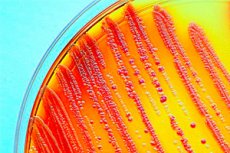New publications
New small molecule offers hope in the fight against antibiotic resistance
Last reviewed: 02.07.2025

All iLive content is medically reviewed or fact checked to ensure as much factual accuracy as possible.
We have strict sourcing guidelines and only link to reputable media sites, academic research institutions and, whenever possible, medically peer reviewed studies. Note that the numbers in parentheses ([1], [2], etc.) are clickable links to these studies.
If you feel that any of our content is inaccurate, out-of-date, or otherwise questionable, please select it and press Ctrl + Enter.

Researchers at the University of Oxford have developed a new small molecule that can suppress the evolution of antibiotic resistance in bacteria and make resistant bacteria more susceptible to antibiotics. The results of the study were published in the journal Chemical Science.
The global rise of antibiotic-resistant bacteria is one of the greatest threats to public health and development, as many common infections become increasingly difficult to treat. Drug-resistant bacteria are already directly responsible for about 1.27 million deaths worldwide each year and contribute to an additional 4.95 million deaths. Without rapid development of new antibiotics and antimicrobials, this figure will increase significantly.
A new study by scientists from the Ineos Oxford Institute for Antimicrobial Research (IOI) and the Department of Pharmacology at the University of Oxford offers hope of discovering a small molecule that works in combination with antibiotics to suppress the evolution of drug resistance in bacteria.
One way that bacteria become resistant to antibiotics is through new mutations in their genetic code. Some antibiotics (such as fluoroquinolones) work by damaging the DNA of bacteria, causing the cells to die. However, this DNA damage can trigger a process known as the "SOS response" in the affected bacteria. The SOS response repairs damaged DNA in bacteria and increases the rate of genetic mutations, which can speed up the development of antibiotic resistance. In a new study, scientists at Oxford have identified a molecule that can inhibit the SOS response, thereby increasing the effectiveness of antibiotics against these bacteria.
The researchers studied a series of molecules previously reported to increase the sensitivity of methicillin-resistant Staphylococcus aureus (MRSA) to antibiotics and prevent the MRSA SOS response. MRSA is a type of bacteria that normally lives harmlessly on the skin. But if it gets inside the body, it can cause a serious infection that requires immediate antibiotic treatment. MRSA is resistant to all beta-lactam antibiotics, such as penicillins and cephalosporins.
The researchers modified the structure of different parts of the molecule and tested their activity against MRSA in combination with ciprofloxacin, a fluoroquinolone antibiotic. This allowed them to identify the most potent SOS response inhibitor molecule, called OXF-077. When combined with different antibiotics from different classes, OXF-077 made them more effective at preventing visible growth of MRSA bacteria.
In a key finding, the team then tested the susceptibility of bacteria treated with ciprofloxacin for several days to determine how quickly antibiotic resistance developed with or without OXF-077. They found that the emergence of ciprofloxacin resistance was significantly suppressed in bacteria treated with OXF-077 compared to those not treated with OXF-077. This is the first study to demonstrate that an SOS response inhibitor can suppress the evolution of antibiotic resistance in bacteria. Moreover, when previously ciprofloxacin-resistant bacteria were treated with OXF-077, their susceptibility to the antibiotic was restored to the level of bacteria that had not developed resistance.
These results suggest that OXF-077 is a useful tool molecule to further explore the effects of inhibiting the SOS response in bacteria and to treat antibiotic-resistant infections. Further studies are needed to test the suitability of these molecules for use outside the laboratory, and this will form part of ongoing work between the IOI and the Department of Pharmacology at Oxford to develop new molecules to slow and/or reverse the development of antibiotic resistance.
